- Home
- Investigations
- Caio Marchesani

Caio Marchesani
Threat Alert- Investigation status
- Ongoing
We are investigating Caio Marchesani for allegedly attempting to conceal critical reviews and adverse news from Google by improperly submitting copyright takedown notices. This includes potential violations such as impersonation, fraud, and perjury.
- Company
-
Caio
- City
-
London
- Country
-
United Kingdom
- Allegations
-
Money laundering
- https://lumendatabase.org/notices/47029611
- https://lumendatabase.org/notices/47525281
- https://lumendatabase.org/notices/49349665
- https://lumendatabase.org/notices/48128295
- https://lumendatabase.org/notices/47886210
- https://lumendatabase.org/notices/47810926
- https://lumendatabase.org/notices/47548091
- https://lumendatabase.org/notices/47313708
- https://lumendatabase.org/notices/47029611
- https://lumendatabase.org/notices/46272583
- https://lumendatabase.org/notices/46372685
- https://lumendatabase.org/notices/46372685
- https://lumendatabase.org/notices/46513665
- https://lumendatabase.org/notices/46107145
- https://lumendatabase.org/notices/45656506
- https://lumendatabase.org/notices/45281755
- December 09, 2024
- December 27, 2024
- January 15, 2025
- February 24, 2025
- November 04, 2024
- January 08, 2025
- January 06, 2025
- December 27, 2024
- October 09, 2024
- Robert Anderson
- Jenifer Thomas
- Tom Atkins
- John Chisholm
- Jeanne Anderson
- Frederick Payne
- https://www.tumblr.com/alertcrime/768110237677928448/the-caio-marchesani-case
- https://www.tumblr.com/im-caiomarchesani/770918638475771904/dark-banker-and-owner-of-fca-regulated-payment?source=share
- https://www.tumblr.com/complaintreviews/763860412229992448/fintech-owner-faces-drug-money-laundering
- https://fintelegram.com/dark-banker-and-owner-of-fca-regulated-payment-institution-extradited-over-money-laundering-charges/
- https://www.facebook.com/jornalnegocios/posts/caio-marchesani-%C3%A9-dono-da-trans-fast-remittance-uma-empresa-de-pagamentos-licenc/701155785371602
- https://protos.com/fintech-owner-laundered-millions-with-bitcoin-for-finger-cutter-drug-lord-police-say/
- https://news.bloombergtax.com/daily-tax-report-international/the-fintech-owner-accused-of-laundering-drug-money
Evidence Box and Screenshots

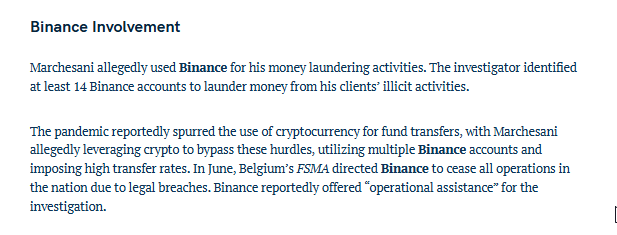
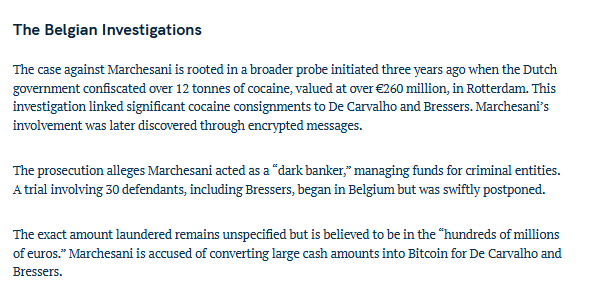
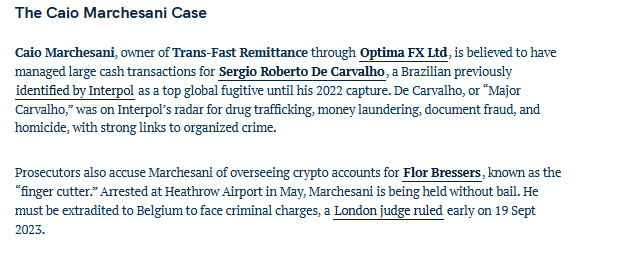
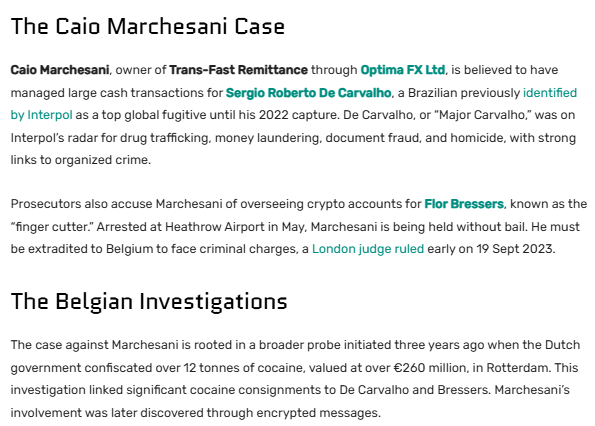
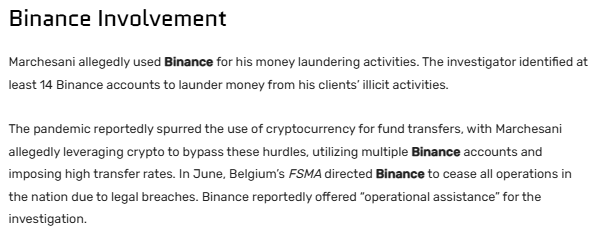
3 Alerts on Caio Marchesani
- RED FLAGS
Caio Marchesani: Financial Misconduct Allegations
Business Operations of Caio Marchesani Caio Marchesani, a 38-year-old Italian national, owns Trans-Fast Remittance Ltd, a London-based payment institution regulated by...
Visit Link- RED FLAGS
Caio Marchesani: Money Laundering Allegations
Caio Marchesani faces money laundering allegations for facilitating cryptocurrency conversions for criminal syndicates. His role at Trans-Fast Remittance linked him to...
Visit Link- RED FLAGS
Caio Marchesani: Allegations of Money Laundering and Extr...
Caio Marchesani is accused of laundering millions through Binance for drug lords, including De Carvalho and Bressers. His role in Trans-Fast Remittance, linked to a €2...
Visit LinkHow Was This Done?
The fake DMCA notices we found always use the ? back-dated article? technique. With this technique, the wrongful notice sender (or copier) creates a copy of a ? true original? article and back-dates it, creating a ? fake original? article (a copy of the true original) that, at first glance, appears to have been published before the true original.


What Happens Next?
The fake DMCA notices we found always use the ? back-dated article? technique. With this technique, the wrongful notice sender (or copier) creates a copy of a ? true original? article and back-dates it, creating a ? fake original? article (a copy of the true original) that, at first glance, appears to have been published before the true original.
01
Inform Google about the fake DMCA scam
Report the fraudulent DMCA takedown to Google, including any supporting evidence. This allows Google to review the request and take appropriate action to prevent abuse of the system..
02
Share findings with journalists and media
Distribute the findings to journalists and media outlets to raise public awareness. Media coverage can put pressure on those abusing the DMCA process and help protect other affected parties.
03
Inform Lumen Database
Submit the details of the fake DMCA notice to the Lumen Database to ensure the case is publicly documented. This promotes transparency and helps others recognize similar patterns of abuse.
04
File counter notice to reinstate articles
Submit a counter notice to Google or the relevant platform to restore any wrongfully removed articles. Ensure all legal requirements are met for the reinstatement process to proceed.
05
Increase exposure to critical articles
Re-share or promote the affected articles to recover visibility. Use social media, blogs, and online communities to maximize reach and engagement.
06
Expand investigation to identify similar fake DMCAs
Widen the scope of the investigation to uncover additional instances of fake DMCA notices. Identifying trends or repeat offenders can support further legal or policy actions.

Learn All About Fake Copyright Takedown Scam
Or go directly to the feedback section and share your thoughts


Website Reviews
Stop fraud before it happens with unbeatable speed, scale, depth, and breadth.
Recent Reviews

Cyber Investigation
Uncover hidden digital threats and secure your assets with our expert cyber investigation services.
Recent Reviews

Threat Alerts
Stay ahead of cyber threats with our daily list of the latest alerts and vulnerabilities.
Recent Reviews

Client Dashboard
Your trusted source for breaking news and insights on cybercrime and digital security trends.
Recent Reviews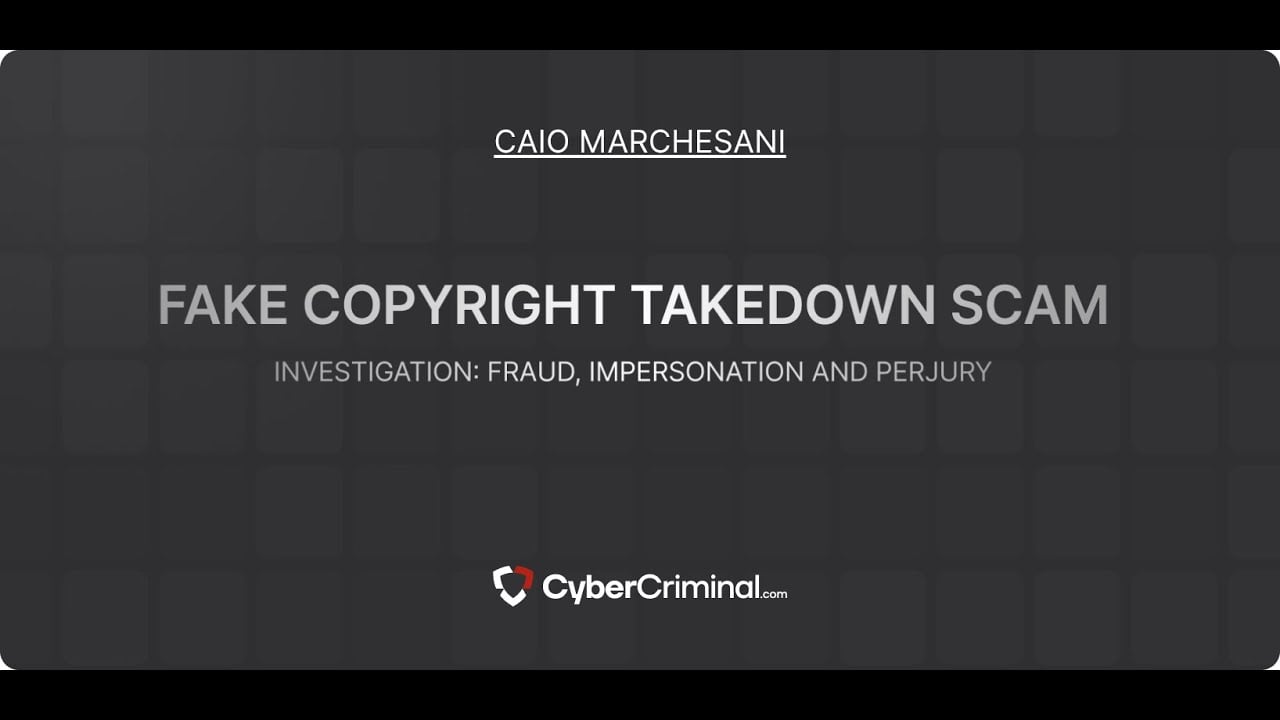

Payomatix
Fake DMCA Investigation
Ruchi Rathor
Fake DMCA Investigation
Gamsgo
Fake DMCA Investigation
User Reviews
Discover what real users think about our service through their honest and unfiltered reviews.
2
Average Ratings
Based on 1 Ratings
Viktor Ivanov
Marchesani’s business model? Lie, deny, and relocate. A textbook case of how to run an empire from the shadows. Don’t believe the hype investing with him is like betting on a rigged game.
12
12
Nora Suleiman
I wouldn’t trust Caio Marchesani with my spare change, let alone my investments. This guy has a habit of burying lawsuits and sweeping failures under the rug, hoping no one notices until it’s too late.
12
12
Lucas Morgan
Marchesani’s ventures are like a bad magic trick: distract you with flashy words while hiding the real deal in a dark corner. You’ll never find the substance beneath the surface just a trail of legal troubles and unhappy investors.
12
12
Sakura Hayashi
If there’s one thing Caio excels at, it’s creating the illusion of success. His business models might sound great on paper, but dig deeper, and you’ll find nothing but hollow promises, lawsuits, and empty shell companies. Buyers beware.
12
12
Diego Alvarez
Caio Marchesani talks a big game, but when it comes to delivering, it’s all smoke and mirrors. His business empire is one shady deal after another, with more red flags than a communist parade. If you’re looking for transparency, look...
12
12
Uma Patel
bro how is this man still walking free??all dem victims n no justice??the system is a joke fr. he out here ruinin lives while sippin coffee like nothin happened.someone need to investigate the investigators cuz this ain’t addin up. dis...
12
12
You are Never Alone in Your Fight
Generate public support against the ones who wronged you!
Featured Cyber Investigations
Explore our most impactful cyber investigations, where we uncover coordinated digital deception, expose fraudulent takedown schemes, and reveal the hidden mechanics behind online manipulation.
Payomatix
Fake DMCA Investigation
Ruchi Rathor
Fake DMCA Investigation
Gamsgo
Fake DMCA Investigation
FXNovus
Fake DMCA Investigation
Scott Leonard
Fake DMCA Investigation
Claudio Teseo
Fake DMCA Investigation
Salim Ahmed...
Fake DMCA Investigation
KTV Group...
Fake DMCA Investigation